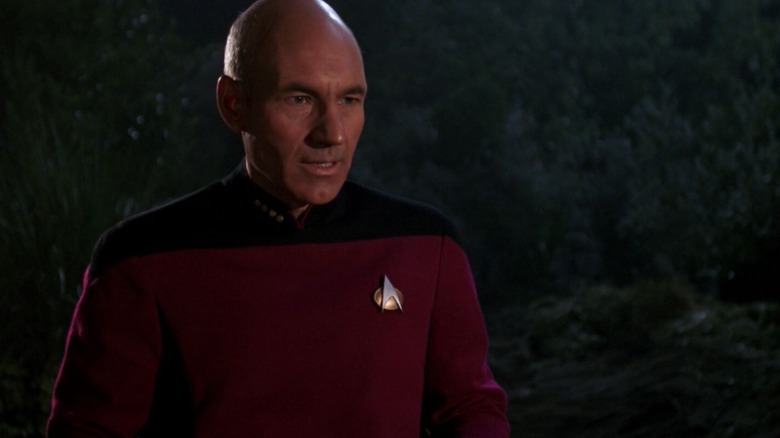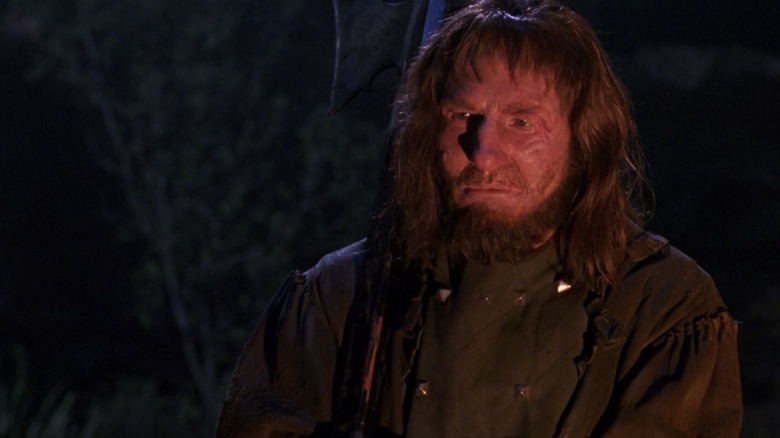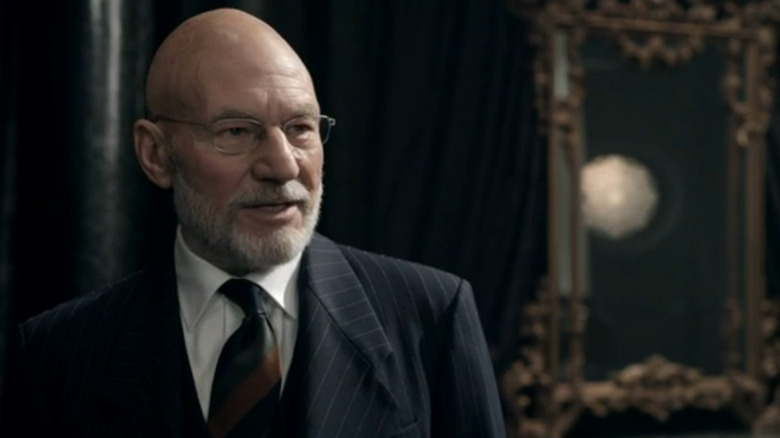Star Trek's Patrick Stewart Once Played A Shakespearean Character On TNG, And You Probably Missed It
The "Star Trek: The Next Generation" episode "The Defector" (January 1, 1990) begins with Captain Picard (Patrick Stewart) watching Data (Brent Spiner) enacting a scene from William Shakespeare's "Henry V" on the holodeck. For those who missed reading "Henry V" in high school, the story follows the young, recently crowned King Henry as he gears up to invade France. The young Hal struggles to be taken seriously, as his youth was spent carousing with drunks and lowlifes (as seen in "Henry IV" parts I and II). Hal, however, proves to be an inspiring battlefield presence, giving his fellow Englishmen the encouraging speeches they need to charge into battle. The play culminates at the Battle of Agincourt, which took place in 1415.
On "Star Trek," the scene that Data performs comes from Act IV, scene I, when King Henry has disguised himself as one of his own soldiers. He aims to infiltrate his men and get a line on what they might think of him as a commander. The scene is, like in many Shakespeare productions, greatly truncated from the actual play's text, but the spirit remains the same. In the play, Henry speaks to three guards named Bates, Williams, and Court. On "Star Trek," Williams and Court are amalgamated into one character.
The Williams/Court character has long hair and a craggy face, seemingly scarred from previous battles. He doesn't have many lines of dialogue, and he doesn't play a major part in the play, but he is significant to Henry. He's the average British citizen who speaks his mind. And because Henry V is in disguise, he feels free to do so.
Looks closely, and you'll notice that Williams/Court is played by Stewart, under heavy makeup. It was the only character that Stewart played on "Star Trek" other than Captain Picard (well, holographic recreations and alien doppelgängers notwithstanding).
Patrick Stewart played a holographic character from Henry V
Data performs his scene in full Shakespearean costume, while Picard, looking on, compliments his performance. Data says that he is studying the acting techniques of Olivier, Branagh, Shapiro, and Kullnark. How flattering that Kenneth Branagh — whose 1989 "Henry V" movie was still in theaters when this episode aired — should already be namechecked as one of the greats, marked by historians in the 24th century. Picard and Data note that Data's performance was meant to explore the human condition, and, as Picard points out, there's no better way to do that than via Shakespeare.
The amusing part is that the camera cuts from a shot of Stewart as Williams to a shot of Stewart as Captain Picard. Not only did Stewart get to play two characters on "Star Trek," but he got to do them in the same scene. Usually, that sort of thing is reserved for Brent Spiner.
Stewart's involvement in a scene from "Henry V" isn't surprising, given the actor's long history with the Bard. Prior to "Star Trek," Stewart was a widely celebrated stage and screen actor who was a part of the Royal Shakespeare Company going all the way back to 1966. He made his Shakespearean debut the year previous, playing Shylock in "The Merchant of Venice" at the Old Vic, and started up his Royal Shakespeare gig in '66, playing the Player King in "Hamlet." He would go on to play the Dauphin in "Henry V," Grumio in "The Taming of the Shrew," Cornwall in "King Lear," the amusing Launce in "The Two Gentlemen of Verona," and both Oberon and Snout in two different tours of "A Midsummer Night's Dream."
So, yeah, Stewart was hardly a Shakespeare neophyte when asked to read a few lines for "Henry V" on "Star Trek." One can almost see Stewart's relief, slipping into territory he was very familiar with.
Stewart continued to star in Shakespearean plays after Star Trek
Stewart's Shakespearean credits also spread to the screen. He played Claudius in the BBC's staging of "Hamlet" back in 1980, starring opposite Derek Jacobi as Hamlet. Here's som fun trivia: Stewart would play Claudius again in a 2009 production of "Hamlet," opposite David Tennant. In that production, he also played the Ghost of Hamlet's Father, meaning Claudius and Old Hamlet were identical twins. Meanwhile, Derek Jacobi would go on to play Claudius opposite Kenneth Branagh in the 1996 "Hamlet" movie.
Weirdly, Stewart wasn't offered lead roles in Shakespeare's plays until after he had finished his small-screen run on "Star Trek: The Next Generation" in 1994. In 1995, he finally played Prospero in "The Tempest" at the New York Shakespeare Festival. Two years later, he controversially played Othello in a race-flipped version of that character's play. In 2006, he would return to the Royal Company to play Prospero again, as well as Mark Antony in "Antony and Cleopatra." He would also play Malvolio in "Twelfth Night" and Macbeth.
Fittingly, Stewart's most recent Royal Shakespeare outing was once again playing Shylock in 2011. 45 years later, he had a chance to revisit the same role. This, after returning to the role of Jean-Luc Picard on the 2020 series "Star Trek: Picard." Stewart also played the superhero character Professor X in multiple "X-Men" movies, and he will revisit that role as well in the upcoming 2026 film "Avengers: Doomsday." Stewart is a capable actor with a great deal of range, but he also knows when it's safe to stay in a certain actorly comfort zone.


